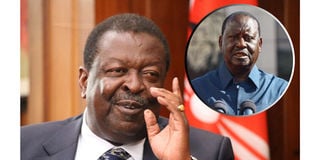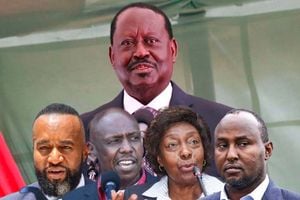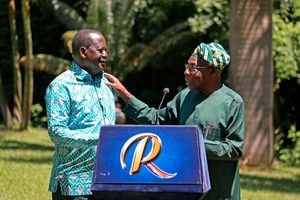
Prime Cabinet Secretary and Foreign Affairs CS Musalia Mudavadi, in an exclusive interview with the Nation, revealed the reason behind Kenya Kwanza’s decision to back Azimio leader Raila Odinga’s (inset) bid for AUC chair.
President William Ruto’s administration has for the first time come out to explain why it settled on Azimio leader Raila Odinga for the chairmanship of the African Union Commission (AUC).
In an exclusive interview with the Nation, Prime Cabinet Secretary and Foreign Affairs CS Musalia Mudavadi said despite opposing President William Ruto in the last election, the government’s decision to back the opposition leader for the position “transcends domestic politics and resonates with President Ruto’s agenda of inclusive leadership”.
Mr Mudavadi, however, denied claims that the government settled on Mr Odinga at the expense of former president Uhuru Kenyatta, stating that “the discussions centred around identifying the most qualified candidate to represent Kenya and champion Africa’s interests”.
Here are excerpts from the interview:
How did the government arrive at its AUC candidate, Mr Raila Odinga?
The selection of Hon Raila Odinga as Kenya’s candidate for the AUC chairmanship was a well-considered decision based on his extensive experience and qualifications. Hon Odinga is not a newcomer to the AU. He previously served as the High Representative for Infrastructure Development, demonstrating a deep understanding of the AU’s inner workings and the challenges facing the continent.
Beyond his experience within the AU, and as former Prime Minister, he brings a wealth of political, diplomatic, and administrative experience to the table.
Having been the most vicious critic of the Kenya Kwanza administration, even organising anti-government protests, what could have influenced your support for Mr Odinga?
The decision to support Hon Odinga for the AUC chairmanship transcends domestic politics and resonates with President William Ruto’s agenda of inclusive leadership.
While there may be political differences within Kenya, the national interest in securing the AU chairmanship for a qualified Kenyan leader supersedes those differences.
Is there a hidden card in the government’s support for Mr Odinga?
The Kenya Kwanza administration operates with transparency and accountability. There is no ‘hidden card’ or ulterior motive behind our support.
Our decision is based on a thorough evaluation of his qualifications and potential to contribute significantly to the AU’s future.

ODM presidential candidate Raila Odinga (right), his running mate Kalonzo Musyoka (left) and AU Commission chairperson Moussa Faki Mahamat (second from right) at Capitol Hill Square in Nairobi on July 19, 2017.
Some political players see it as a move to edge out Mr Odinga from the local political scene ahead of the 2027 election. What’s your take on this?
There seems to be an unnecessary focus on the 2027 elections at this stage. The Kenya Kwanza administration’s primary objective is improving the livelihoods of Kenyans through the Bottom-up Economic Transformation Agenda.
Let’s be clear – Hon Odinga is a seasoned politician and even if he assumes the role of AUC chairperson, his passion for Kenya will remain undimmed. He will have the opportunity, on the global stage, to contribute to a much broader agenda, one that benefits not only Kenya but all of Africa.
Also Read: What roles does the AUC chairperson perform?
Mr Odinga says he will not leave local politics even if he wins the AUC post. Is this tenable based on the AU requirements?
Those assertions highlight his unwavering commitment to his homeland. However, it’s important to understand the distinction between political engagement and holding an elected office.
The AU has specific requirements for its chairperson and these preclude holding a political office concurrently. While Hon Odinga may not be eligible to run for elected positions in Kenya, he still has the right to express his views and engage in public discourse necessary to shape Kenya’s future. The Kenyan Constitution guarantees these freedoms and Hon Odinga would retain the right to exercise them.
What will Kenya Kwanza do in case Mr Odinga wins this post but continues to play anti-government politics?
Our support for Hon Odinga’s candidacy is based on our firm belief in his qualifications to lead the AU effectively. We have no reason to believe that, as AUC chairperson, he would engage in activities detrimental to Kenya’s interests.
Is there a secret handshake between President Ruto and Mr Odinga?
The decision to support Hon Odinga was reached through a transparent and consultative process within the government focusing on identifying the candidate best suited to represent Kenya on the continental stage.
President Ruto and Hon Odinga may have engaged in bilateral discussions leading to the current process.
Explain what you meant by an impending 'big announcement' when you visited Mr Odinga's Bondo backyard in January.
I would request that you allow me to retain the mystery of my statement! However, what I can say is that supporting a son of Bondo to aspire to be the most senior bureaucrat certainly ranks as a big announcement, wouldn’t you say?
Were you alluding to his AU bid with support of the government? What was it?
There is definitely more news in the pipeline.
Why is Kenya keen on the African Union Commission post?
Kenya aspires to contribute leadership at the very pinnacle of the African Union. We have a long history of Pan-Africanism, actively participating in forming the AU’s predecessor, the Organization of African Unity (OAU).
A successful Kenyan candidacy would pave the way for future aspirations just as other African nations have seen their leaders ascend to prominent international positions such as the UN Secretary-General.
What are some of the benefits Kenya stands to gain from securing the post?
The benefits of securing the AUC chairmanship extend far beyond simply having a Kenyan at the helm. First, it would significantly raise Kenya’s profile on the global stage.
Secondly, it would provide Kenya with a stronger platform to advocate for Africa’s interests in the international arena.
Thirdly, securing the AUC chairmanship would lead to enhanced diplomatic influence and partnerships for Kenya.
Are there threats to Kenya’s bid for this post?
While there may be challenges in any competitive election, we choose to focus on the positive aspects of Hon Odinga’s candidacy and the value he brings to the AU.
Our campaign will emphasize his extensive experience, strong relationships across the continent and unwavering dedication to Pan-Africanism. We believe that by showcasing these strengths and engaging in constructive dialogue with other member states, we can effectively address any potential concerns and ultimately secure a successful outcome for Kenya’s bid.
What do you make of a proposed rule that nations that have held senior positions in the organisation may not be eligible to contest?
We are aware that there have been discussions regarding such a rule. Kenya values democratic processes and open discussions within the AU but at this stage, it’s too early to speculate on whether it will come to pass given that decisions at the AU are ordinarily made by consensus.
Kenya’s approach is to remain focused on Hon Odinga’s strong candidacy and qualifications. We are confident that through open and respectful dialogue, all member states will reach a decision that prioritises the best interests of the AU and its future leadership.
Do you think it’s an unfair proposal coming at this time when Kenya is gearing up for the position?
Kenya believes in a strong and functional AU. We support AU reforms including any proposal that strengthens its long-term agenda of a more united Africa.
I believe the focus should be on identifying leaders with the necessary experience, skills, and vision to navigate the AU’s complex challenges, regardless of their or fellow countrymen’s previous positions within the AU.












